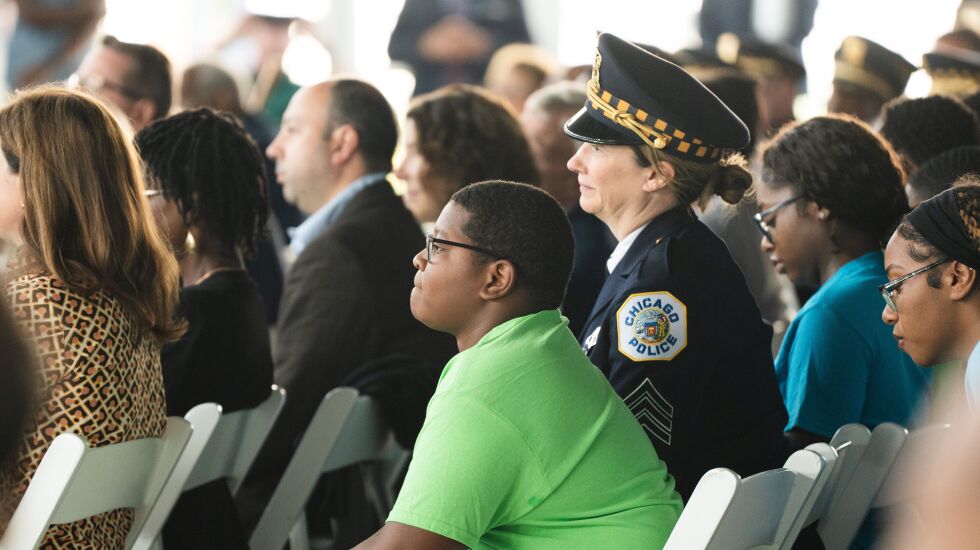
For an example of the difference that access to after-school activities can make in the lives of young people, consider the city’s newest Boys & Girls Club in Garfield Park.
There was loud opposition two years ago to the idea of locating the club on the campus with the city’s new public safety academy. Having African American and Latino young people in close proximity to large numbers of police officers was indeed a radical idea that had to be done right, as this editorial board said at the time.
But plans went ahead, and in August, the $15 million Rusu-McCartin Boys & Girls Club opened on a long-vacant parcel of land at 4411 W. Chicago Ave. A community youth council helped determine what kind of programs the club offers, and will do the same working on long-range plans for partnerships with police and firefighters — the part that really has to be done right.
Already, we’re told, the club serves up to 100 youth a day from Garfield Park and surrounding West Side neighborhoods and has a long waiting list. With ample space — 27,000 square feet, including a gym, a large kitchen, maker space and more — the club could easily provide more activities if it had enough staff.
“For so many years, this [lot] was just trees and dirt,” the club’s director, Tevin Haynes, told us in a meeting with the editorial board this fall. “Now it’s a kind of sanctuary... a beacon of hope for our kids.”
Can the new club make good on its broader long-term goal of fostering better relationships between Chicago police and young people of color? We hope the answer is yes — though it’s worth pointing out that Chicago police, as well, must be proactive and do their part too.
Even so, it’s encouraging to hear this from a young woman on the youth council:
“Every single interaction changes how I think and feel about police and the academy,” Re’Yonna Igess told the editorial board. “The one-on-one interaction is totally different from what they [police] have to do for their jobs. That one-on-one interaction should be there. ... That connection helps every interaction that comes after that.”
Safe places and programs to keep kids engaged
That a new Boys & Girls Club seems to be making a positive difference for young people in a tough neighborhood — and could do more — is a reminder of this: Young people all across our state, especially in neighborhoods hard-hit by decades of disinvestment, deserve safe places and programs to keep them engaged and out of trouble.
Research has shown, time and again, that after-school hours are when young people are most vulnerable, likely to engage in, or become a victim of, violence or other dangers. And for every young person already enrolled in an after-school program in Illinois, four more are waiting for a chance to participate.
So we urge the Illinois Legislature and the governor’s office to do whatever they can, in the veto session that starts Nov. 7, to find money to keep vital after-school programs up and running.
Activists and supporters recently called for $50 million in supplemental appropriations, to allow time for setting up contracts with program providers.
“If we have to wait until May, we won’t have contracts in place by next year,” Susan Stanton of ACTNow told us. Summer programs are also at risk, she added. “We don’t want that to be the time when the gap [in access] opens.”
The money is needed to make up for a costly spending error by the Illinois State Board of Education, which overspent federal after-school funds and left some organizations scrambling to keep from shutting down programs. Thousands of students have already lost access to activities, and some 42,000 more children, including in Chicago, will lose out by June 20, 2024, according to ACTNow (After School Children and Teens Now), a statewide advocacy organization.
Illinois has no shortage of pressing needs, and its coffers are not limitless. After-school programs have never had ample funding, and that’s a larger problem that will need to be solved.
But kids shouldn’t have to pay the price for mistakes made by ISBE.
As Michael Crowley, the president and CEO of Boys & Girls Club of Chicago, told us, after-school isn’t just about the risk to kids. “There’s also tremendous opportunity, for young people to find their passion, to discover their potential, to build their confidence.”
Illinois should get behind creating those opportunities.
Send letters to letters@suntimes.com







